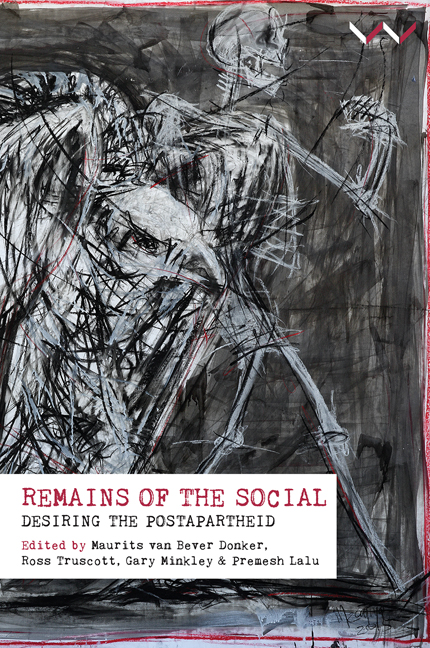Book contents
- Frontmatter
- Contents
- Acknowledgements
- Preface
- Chapter 1 Traversing the Social
- Chapter 2 The Mandela Imaginary: Reflections on Post-Reconciliation Libidinal Economy
- Chapter 3 The Return of Empathy: Postapartheid Fellow Feeling
- Chapter 4 The Ethics of Precarity: Judith Butler's Reluctant Universalism
- Chapter 5 Hannah Arendt's Work of Mourning: The Politics of Loss, ‘the Rise of the Social’ and the Ends of Apartheid
- Chapter 6 Souvenir
- Chapter 7 Re-Cover: Afrikaans Rock, Apartheid's Children and the Work of the Cover
- Chapter 8 The Graves of Dimbaza: Temporal Remains
- Chapter 9 The Principle of Insufficiency: Ethics and Community at the Edge of the Social
- Chapter 10 The Trojan Horse and the ‘Becoming Technical of the Human’
- About the Contributors
- List of Figures
- Index
Preface
Published online by Cambridge University Press: 21 April 2018
- Frontmatter
- Contents
- Acknowledgements
- Preface
- Chapter 1 Traversing the Social
- Chapter 2 The Mandela Imaginary: Reflections on Post-Reconciliation Libidinal Economy
- Chapter 3 The Return of Empathy: Postapartheid Fellow Feeling
- Chapter 4 The Ethics of Precarity: Judith Butler's Reluctant Universalism
- Chapter 5 Hannah Arendt's Work of Mourning: The Politics of Loss, ‘the Rise of the Social’ and the Ends of Apartheid
- Chapter 6 Souvenir
- Chapter 7 Re-Cover: Afrikaans Rock, Apartheid's Children and the Work of the Cover
- Chapter 8 The Graves of Dimbaza: Temporal Remains
- Chapter 9 The Principle of Insufficiency: Ethics and Community at the Edge of the Social
- Chapter 10 The Trojan Horse and the ‘Becoming Technical of the Human’
- About the Contributors
- List of Figures
- Index
Summary
Remains of the Social is, as we note in our acknowledgements, a product of a critical engagement between the SARChI Chair in Social Change at the University of Fort Hare, the Centre for Humanities Research at the University of the Western Cape, and their respective research partners. As such, this volume, read as a coherent project in itself, might also be read alongside wider collaborations and developments, and in anticipation of subsequent volumes that broaden, deepen and extend the discussions around the social into areas that might seem absent from this volume.
Most studies on the social as it comes to bear on the postapartheid – and studies of social cohesion could be included here – take the social as an ideal that must either be vigorously defended or triumphantly declared. Remains of the Social offers another perspective. Pressuring assumptions of rational progress for society and the subject, we begin by putting the social into question, asking after the ways in which, and the ends to which, it is invoked and given its itineraries, attending to the epistemological grounds of the social. In doing so, the volume inquires into that which is remaindered in the production of the social. In other words, Remains treats the social as a problematic, one from which it is difficult to emerge unscarred.
The interventions collected here ask after what is rendered unliveable as a condition of possibility of the social. This unliveability most readily recalls Judith Butler's concept of precarity – the ungrievability of certain lives that engenders their unliveablility, a theme taken up by several contributors here – but it recalls, also, and importantly, the rupture that, for Walter Benjamin, clears the ground for his critique of time and progress in his ‘Theses on the Philosophy of History’. Indeed, what is explored here, in various ways, is the notion that the very question of loss, as Zita Nunes has argued, might be read not only as constitutive of, or constituted by, the social – the social produced through loss, the grave as its first commemorative sign, or the social apportioning life and death and designating its grievability – but rather as a masking of that which enables the constitution of the social: the remainder, which we propose against conceptions of mourning and its failures, melancholia and nostalgia, which one finds more frequently in studies on the social.
- Type
- Chapter
- Information
- Remains of the SocialDesiring the Postapartheid, pp. ix - xPublisher: Wits University PressPrint publication year: 2017



